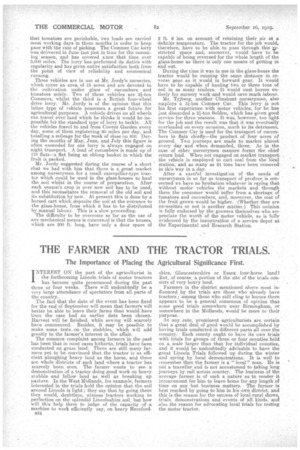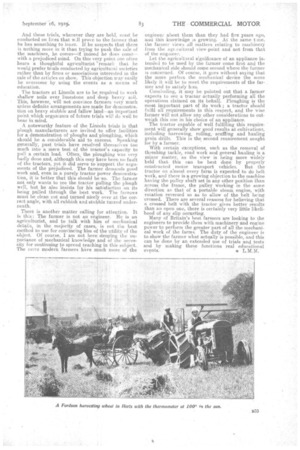THE FARMER AND THE TRACTOR TRIALS.
Page 12

Page 13

If you've noticed an error in this article please click here to report it so we can fix it.
The Importance of Placing the Agricultural Significance First
INTEREST ON the part of the agriculturist in the forthcoming Lincoln trials of motor tractors has become quite pronounced during the past three or four weeks. There will undoubtedly be a very large attendance of spectators from all parts of the country. The fact that the date of the event has been fixed for the end of September will mean that farmers will better be able to leave their farms than would have been the case had' an earlier -date been chosen. Harvest will be finished, while sowing will scarcely have commenced. Besides, it may be possible to make some tests, on the stubbles, which will add greatly to the farmer's interest in the affair.
The common complaint among farmers in the past has been that in niost cases hitherto, trials have been conducted on grass land. There are still many farmers yet to be crinvinced that the tractor is-as efficient ploughing heaVy land as the horse, and there arc whole districts of such land where a tractor has scarcely been • seen. The -farmer wants to see a demonstration of a tractor doing good work on heavy stubble and fallow land as well as breaking up Pasture.' In the West Midlands, for example, farmers interested in the trials hold the-opinion that the soil around Lincoln is light ; they .say that by going there they would, doubtless,. witness tractors working to perfection on the splendid Lincolnshire soil, but how will this help them to judge of the capacity of a machine to work efficiently say, on heavy Hereford
a34 shire, Gloucestershire or Essex four-horse land ? But, of course, a portion of the site of the trials consists of very heavy land.
Farmers in the district mentioned above most influenced by the trials are those who already have tractors ; among those who still cling to horses there appears to be a general consensus .of opinion that some good trials somewhere near Birmingham, or somewhere in the Midlands, would be more to their purpose.
At any rate, prominent agriculturists are certain that a great deal of good would he aecomplished by having trials conducted in different parts all over the country. Each county ought to have its own trials with trials for groups of three or four counties held on a scale larger than that for individual counties, and it would be undoubtedly advisable to have the great Lincoln Trials followed up during the winter and spring by local demonstrations. It is well to remember then the farmer is a " local " man. He is not a traveller and is not accustomed to taking long journeys by rail across country. The business of the average farmer is of such a nature as to render it inconvenient for him to leave home for any length of time on any but business matters. The farmer is best reached by going to him in his own district, and this is the reason for the success of local rural shows, trials, demonstrations and events of all kinds, and also the reason for advocating local trials for testing the motor tractor. And these trials, wherever they are held, must be conducted on lines that w.11 prove to the farmer that he has something to learn. If he suspects that there is nothing more in it than trying to push the sale of the machines, he comes—if indeed he does come-with a prejudiced mind. On this very point one of ten hears a thoughtful agriculturist *remark that he would prefer trials conducted by agricultural societies rather than by firms or associations interested in the sale of the articles on show. This objection may easily be overcome by using the events as a means of education.
The tractors at Lincoln are to be required -to work shallow soils over limestone. and 'deep heavy soil. This, however, will not..convince farmers very much unless definite arrangements are made for demonstration on heavy stubble and fallow land—an important point which organizers of future trials will do well to bear in mind.
A noteworthy feature of the Lincoln trials is that plough manufacturers are invited to offerfacilities for a demonstration of ploughs and ploughing, which should be a considerable aid. to success. Speaking generally, past trials have resolved themselves too mueh into a Mere test ofthe tractor's capacity to pull a certain load. Often, the ploughing was very badly done and, although this may have been no fault of the tractors, yet it did serve to support the arguments of the prejudiced. The farmer demands good work and, even in a purely tractor power demonstration, it is better that this should be .so. The farnier not only wants to see the tractor pulling the plough well, but he also 'insists for his satisfaction on its being pulled through the best work.-The furrows must be clean cut and turned nicely over at the correct angle-, With all rubbish and stubble turned under
neath. . .
There is another matter calling for attention. It is this : ,The farmer is not an engineer. He is an agriculturist, and to talk with hint of mechanical details, in the majority of cases, is not the best method to use for convincing him of the utility of the object. Of course, I am not here denying the importance of mechanical knowledge and of the necessity for continuing to spread teaching in this subjeat.. The more modern farmers have much more of the
engineer about them than they had five years ago, and this knowledge is growing. At the same time, the farmer views all matters relatiug to machinery from the agr.cultural view-point and not from that of the engineer.
Let the agricultural significance of an appliance intended to be used by the farmer come first and the mechanical side should come second where the farmer is concerned. Of course, it goes without saying that the more perfect the mechanical device the mole likely it will be to meet the requirements of the farmer and to satisfy him.
Concluding, it may be pointed out that a fanner expects to sec a tractor actually performing all the operations claimed on its behalf. Ploughing is the most important part of its work ; a tractor should fulfil all requirements in this respect, and the wise farmer will not allow any other considerations to outweigh this one in his choice of an appliance. The tractor capable of well fulfilling this requirement will generally show good results at cultivations, inclUding harrowing, rolling,. scuffling and hauling grain drills. This is the second monument sought for by a farmer.
With certain exceptions, such as the removal of threshing tackle, road work and general hauling is a minor matter, as the view is being more widely held that this can be best done by properly constructed motor transport vehicles-. But the tractor on almost every farm is expected to do belt work, and there is a growing objection to the machine having the pulley shaft set in any other position than across the frame, the pulley working in the same direction as that of a portable steam engine, .with rotation reversed so as to allow of the belt being crossed. There are several reasons for believing that a crossed belt with the tractor gives better results than an open ono, there is certainly very little likelihood of any slip occurring. Many of Britain's hest farmers are looking to the engineers to provide thorn with machinery and engine power to perform the greater part of all the mecanical work of the farms. The duty of the engineer. is to show the farmer what actually is possible, and this can be done by an extended use of trials and.tests and by making these functions real educational
events. • L.M.M.
























